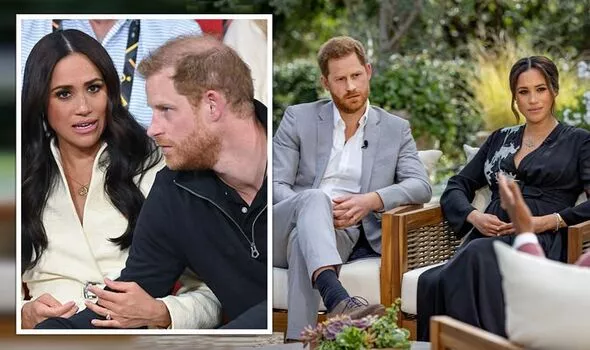King Charles III’s recent decision to reportedly strip Meghan Markle of her title as the Duchess of Sussex has generated intense media attention and stirred debate worldwide.
This significant move comes as Meghan prepares for an upcoming interview with Oprah Winfrey, bringing her back into the spotlight. The decision reflects a shift in the royal family’s approach to managing controversies surrounding Meghan and Prince Harry since they stepped back from their official roles in 2020.
Seen as part of King Charles’s efforts to modernize the monarchy, this action aligns with his strategy to streamline the royal image and address public concerns. By distancing the institution from those no longer serving in official capacities, the King appears committed to reshaping the monarchy for the future.

Meghan Markle’s journey as a member of the British royal family has been anything but smooth. Since marrying Prince Harry in 2018, Meghan has faced relentless media scrutiny and, according to her, institutional resistance within the monarchy. The couple’s dramatic decision to step back from royal duties in early 2020, dubbed “Megxit,” underscored their struggles with the pressures of royal life and their desire to seek greater independence, both financially and personally. Their departure was seen by many as a bold assertion of autonomy but was met with mixed reactions from the public and within royal circles.
The tension reached new heights following Meghan and Harry’s explosive interview with Oprah Winfrey in March 2021. In that interview, the couple made serious allegations about their treatment by the royal family, including issues related to race and mental health. Meghan’s revelations about feeling unsupported and isolated while pregnant, and her and Harry’s candid discussions about racism within the palace, shocked viewers and drew global attention to the inner workings of the monarchy. This interview marked a significant turning point in the public’s perception of the royal family, particularly among younger generations and supporters of racial and social justice.
Revoking royal titles is not a new phenomenon; the British monarchy has a long history of stripping titles from those who either fall out of favor or choose a path divergent from royal expectations. One of the most notable instances was the abdication of King Edward VIII in 1936, who gave up the throne to marry American divorcee Wallis Simpson, leading to a constitutional crisis. Edward’s abdication and the subsequent stripping of his titles were measures taken to preserve the dignity of the monarchy and to align it with the societal norms of the time. In today’s context, however, the decision to strip Meghan of her titles is layered with complex implications about fairness, race, and the evolving role of the monarchy in a modern, multicultural society.

The latest developments have fueled further speculation about the content of Meghan’s upcoming interview with Oprah Winfrey. Set to be broadcast soon, this new interview is expected to delve even deeper into Meghan’s experiences as a royal and the challenges she faced while trying to navigate her new life under the public and institutional eye. Observers anticipate that Meghan will use this platform to address the recent decisions by King Charles III and to provide more context to her and Harry’s choices since leaving the UK.
Public reactions to the news have been deeply polarized. On one side, supporters of Meghan and Harry argue that the stripping of her titles is a punitive action that reflects outdated and discriminatory practices within the monarchy. They believe Meghan’s outspoken stance on issues of race, mental health, and women’s rights is being unfairly punished. On the other side, traditionalists and royalists view Meghan’s actions and recent statements as disruptive to the unity and stability of the monarchy, which they regard as a symbol of national heritage and continuity. They argue that by stepping away from their royal duties, Meghan and Harry have forfeited the privileges and responsibilities that come with their titles.
Social media sites have turned into battlegrounds for this argument, with popular hashtags showing how divided people are still. People of different generations and cultures watch the royal family in different ways. For example, younger, more liberal viewers often contrast with older, more traditional viewers. This public conversation shows how important and difficult it is for the British monarchy to remain relevant in a time when people want more openness, responsibility, and equality.
The whole world is holding their breath as Meghan gets ready to tell her side of the story again. This story not only shows how hard things are for one of the most famous families in the world, but it also makes us think deeply about the future of the monarchy. Will the institution change and adapt to meet these problems, or will it stick to what it has always done? Time will tell, but one thing is for sure: Meghan Markle and the British royal family have a long story to tell.